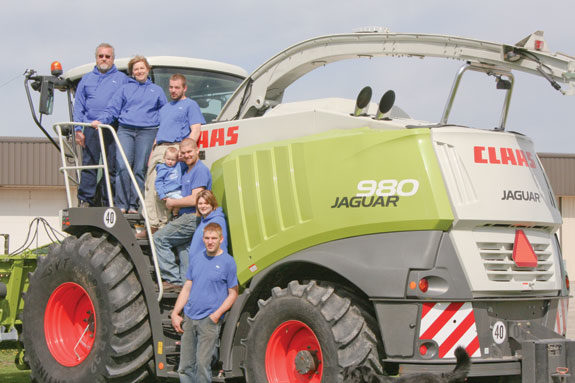The Waupun, Wisconsin family credits much of their success to their father’s decision to transfer his dairying skills to the custom harvesting business he purchased from a neighbor in 1994.
“My brothers and I are the third generation on this farm,” Ike Lemmenes says. “With dad’s dairy background we have a good understanding of the quality dairy farmers need in their forage. In every aspect of our business we put quality first.”
Doing an excellent job often means working up to 18 hours a day during the haying and silage cutting season. In addition to keeping up with ready-now hay and forage, the brothers also manage as many as 15 employees and the maintenance of all their equipment.
“Every one of us has a segment of the business we manage,” Ike says. “We may not always agree 100 percent with each other’s decisions, but we trust each other’s judgment to do what’s best for the business.”
Hectic schedules don’t allow for weekly meetings to strategize and obtain updates. The brothers stay in contact with daily phone calls and sometimes gather briefly around their parents’ coffee pot for more in-depth discussions.
“We make every effort to allow our employees to work around their families’ needs, too,” Ike says. “That can get complicated, but it’s important to us that they’re satisfied. Our management style is hands-on. We get our hands dirty every day. That allows us to keep up with the details of the business.”
Early on in the development of their custom harvesting activities, the Lemmenes family could see that paying for equipment repairs would strain finances and absorb a significant portion of their profits. Their solution to controlling expenses and minimizing downtime was to build a shop on the farm and to complement the maintenance program they developed.
“Other than warranty work, we do most of our own repair and maintenance,” Ike says. “One of us has always been the wrench in the family.
We have a couple of mechanics with good equipment knowledge and experience. Whether it’s the trucks or choppers, clutches or transmissions, we work on it in our shop. Sometimes we learn through trial and error. If we make a mistake, we do our best to learn from it and not repeat it.”
Safety is of prime importance to the Lemmenes family. They avoid equipment and other workplace issues that might jeopardize employee safety.
“You might say we’re achievers,” Ike adds. “If there’s some equipment we need to do our job and we can’t find it on the market, we’ll work at designing and producing it ourselves. We always try to go above and beyond what’s expected of us and what we expect of ourselves.”
In the winter, the Lemmenes thoroughly go through all the equipment and replace any parts that look like they’re worn and might not hold up through the next growing season.
The strong foundation of their business is established on quality equipment. Two Claas JAGUARS handle the Lemmenes’ harvesting chores. Ike says they didn’t have to have two choppers, but that strategy allows them to quickly harvest a field and make the harvesting work easy and convenient for the farmers who grow the crops.
“We do everything we can to make sure the farmers who sell us their forage are happy with the way we harvest their fields,” Ike says. “We never believe in dragging out a job. We come in and get the job done. As much as the farmers don’t mind having us there, the quicker we’re done, the happier the farmer.”
Each day brings new challenges and Ike notes that none of the Lemmenes family nor their employees are troubled with boredom.
“Every day is different,” Ike says. “You never know exactly what’s going to happen. At the height of harvest, we’ll cover 500 acres of hay in a day and chop about 400 tons of corn in an hour.
We start work at six in the morning and usually come home at midnight. The next morning we’ll be back out there by six. The long days are probably one of the biggest trials we face.”
When harvest season is over, distributing manure becomes a daily priority.
“We pump about 150,000 million gallons of manure throughout the year,” Ike says. “Whenever conditions allow, we’ll be hauling. It’s an economic way for farmers to fertilize and makes good use of all the nutrients in the area. We’re using technology to help us move as much manure as possible as efficiently as we can and with the least amount of labor.”
And is it challenging to work with family members day in and day out? At the end of the day, Ike says family-run businesses have many advantages.
“There are times when you wonder if you’re doing the right thing, but we all know that being in business with someone that wasn’t family would greatly change the dynamics of our operation,” Ike says.
“No matter how close you are to someone who isn’t part of your family, there isn’t the same trust level. We’d have to do things a lot differently if we weren’t a ‘brothership.’ From our perspective, a family-owned business usually offers customers a lot of stability.”
Cycling milk prices also confront the Lemmenes family from time to time. Over the years they’ve learned how to work with farmers to ride out the price cycles.
“We’re fortunate to have farmers in the area that are really easy to work with,” Ike says.
The reputation for quality the Lemmenes family has built is one of the trademarks of their business.
“Everyone knows we don’t cut corners,” Ike says. “Everything’s done the way it should be. Taking care of customers is our first priority. Everything else is established on that.” FG
PHOTO: The Lemmenes family, top left: Roy (dad), Lori (mom), Luke, Abe (holding his boy Grahm), Mandy (Abe’s wife) and Isaac. Photo courtesy of the Lemmenes family.

- Loretta Sorensen
- Prairie Hearth Publishing, LLC










